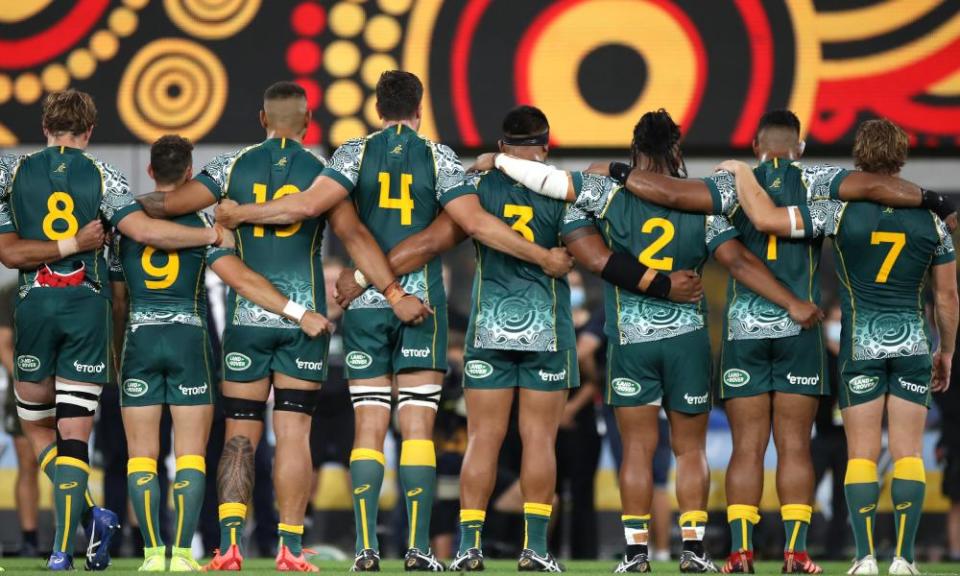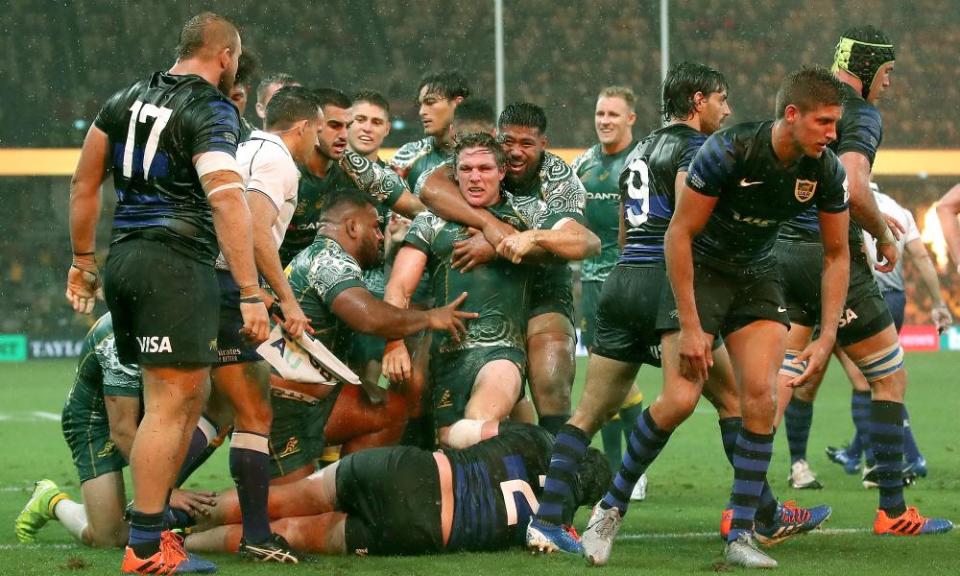Wallabies sing Indigenous language Australian anthem before Tri-Nations draw with Argentina

Under drizzling rain at Bankwest Stadium, in the minutes before the Wallabies’ 16-16 Tri-Nations draw with Argentina, an archaic, divisive tradition may have been replaced with a new one befitting its time.
In a historic moment for an international sporting event, the Australian national anthem was sung in a local Indigenous language.
Related: Australia Wallabies 16-16 Argentina: 2020 Tri Nations rugby – live!
After Graham Davis King gave the Welcome to Country, and Argentina’s anthem was played, Olivia Fox, a young singer from the Newtown Performing Arts School, began her rendition of Australia’s over acoustic guitar.
Before she sang the controversial English version, she did so in the language of the Eora Nation – the Aboriginal coastal clans from the area around the city of Sydney.
Every Wallabies player, wearing their First Nations jersey, had learnt the words by heart and all made that fact known. It was a moment widely applauded and variously described on social media as “spine-tingling”, “classy” and “a huge step forward” for Australian sport.
🖤💛❤️ AMAZING! SO PROUD! #AUSvARG #YourTeam #OurJourney #Wallabies pic.twitter.com/A65tCwrwG5
— Wallabies (@wallabies) December 5, 2020
The exercise was one of inclusivity, the effect a full-bodied slap in the face to every government and sporting body who, until this night, had declined to entertain such a gesture on the misplaced grounds of maintaining ‘tradition’.
The NRL who, to its credit, has previously made similar gestures before All Stars games and Indigenous rounds, was recently guilty of this eyes-wide-shut attitude when it reneged on its plan to discard the national anthem before State of Origin games after the intervention of prime minister Scott Morrison.
But Rugby Australia got this one right, and the moment was arresting enough that it might have rendered the evening’s result irrelevant.
It wasn’t, of course, even if mathematics suggested otherwise. The All Blacks sat prettily and all but unassailably at the top of the Tri-Nations table. Barring a 101-point Wallabies win, Saturday night was a grab for second spot with little more than pride on the line.
But pride is important when it comes to international rugby, and coach Dave Rennie had expressed pre-match hope that a win over Argentina in their final Test of 2020 could act as a springboard for 2021.
The idea, Rennie said, was to turn pressure into points – a key failure in their 15-15 draw against the Pumas a fortnight ago. The first half here no doubt fell short of his expectations. Possession and territory were again with the hosts but they were not matched with attacking ideas against a Pumas defence well up for the fight.

By the break they were down 13-6 and without a try against the South Americans in three halves. By that point Marcos Kremer had been sent to the bin for a dangerous cleanout with no hands against James O’Connor.
That caused less damage than Michael Hooper’s subsequent yellow card for driving his left shoulder into Nicolás Sánchez’s face, for Argentina struck emphatically against 14 men, turning a lineout on their own 22 into an 80m try.
All the talk during the week had been about Pablo Matera, the Argentina captain initially dropped from the XV and stood down from his leadership role after offensive tweets came to light, only to be later reinstated as skipper but not to the matchday squad.
For Pumas coach Mario Ledesma, the disciplinary issues were merely “the hardest” adversity in a year packed full of the stuff, and his pre-match observation that his resilient playing group has “stayed tight” played out quite literally on the field through a tremendous tackling display that may have seized them the match had it not been for Hooper’s 69th-minute try and Reece Hodge’s boot.
Lukhan Salakaia-Loto had been red-carded nine minutes prior for a churlish high shot on Santiago Grondona, but another yellow card to the Pumas removed the numerical disadvantage and, with 14 against 14, Hooper made his break and Hodge nailed the conversion.

 Yahoo Finance
Yahoo Finance 